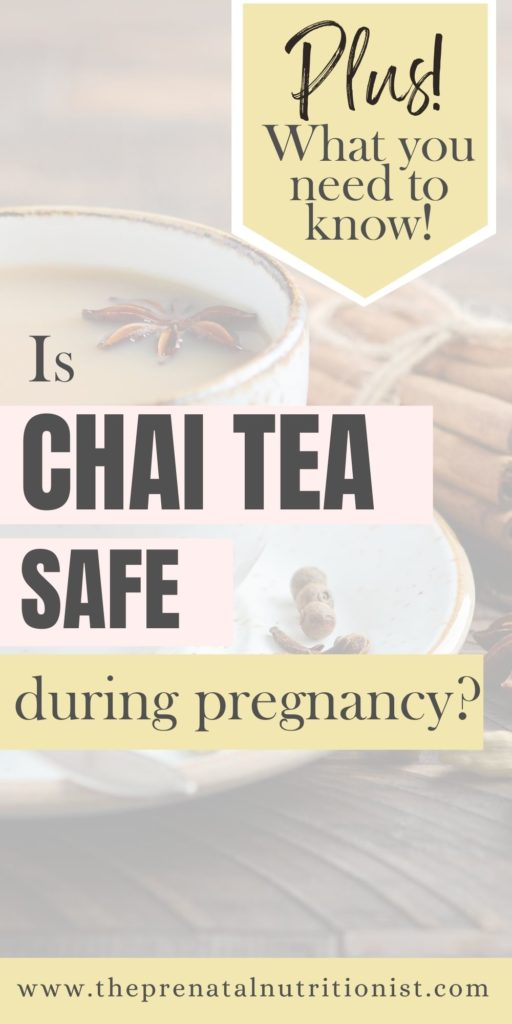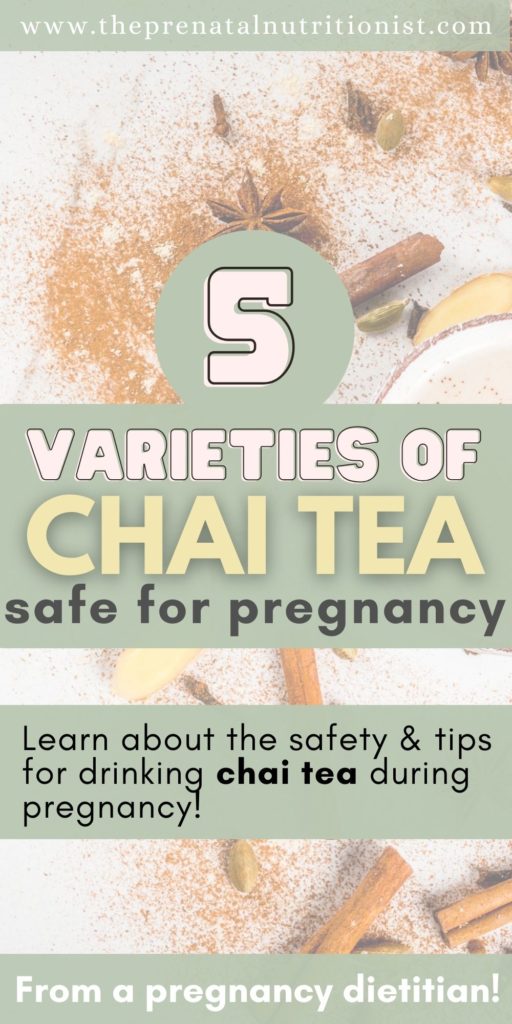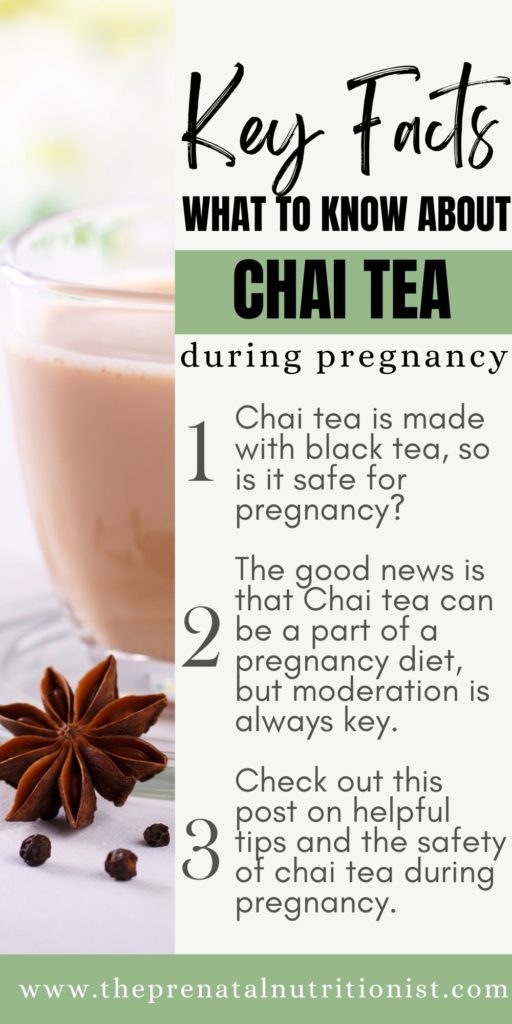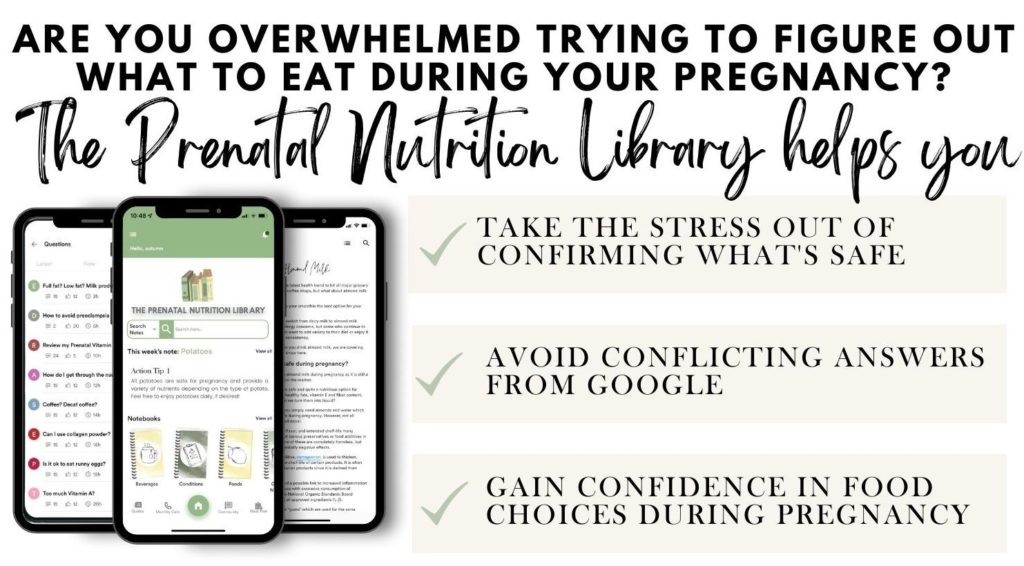
Chai tea, with its delightful blend of spices and flavors like cinnamon, ginger, and nutmeg, stands out as a beloved choice among lovers of tea. It is the perfect blend of sweet, spicy, and flavor. During pregnancy, your dietary considerations take on added significance. Most people begin to pay more attention to what to drink and what not to drink, and their perspective on food and drinks begins to change. There are often a lot of questions about what is safe and not safe for pregnancy. Trust me, momma, you’re not alone! Let’s learn more about enjoying a cup of chai in this post.
One common question that pregnant women often have when it comes to nutrition during pregnancy is, “Do I need to avoid caffeine?”. Some pregnant women are told they should never have caffeine and often feel judged for enjoying a cup of coffee during pregnancy. The good news is that while caffeine intake should be limited, most people do not need to avoid it completely. Learn more about the research on caffeine during pregnancy inside The Prenatal Nutrition Library.
In this post, I’ll be focusing on a simple yet important question: Does Chai Tea contain caffeine? We will also address the possible safety concerns (if any) of Chai Tea during pregnancy so you can know whether or not to avoid Chai lattes!
Does Chai Tea Have Caffeine?
Chai tea typically contains caffeine. One of the main ingredients in chai tea is black tea. Chai tea generally has around 50 mg of caffeine per 8-fluid-ounce cup. However, this can vary and be lower or higher than 50 mg. To put it in perspective, this is less caffeine than you’d find in a cup of coffee, which can range from 95 mg to 165 mg per 8-fluid-ounce serving.
Now, here’s where it gets interesting. Not all Chai teas are created equal when it comes to caffeine content and chai concentrate. Chai’s caffeine can vary depending on several factors, including the type of tea used as the base and the steeping time. Chai blends are most commonly made with black tea leaves, which have more caffeine than those using green tea or caffeine-free herbal alternatives.
Intriguingly, the preparation method can also play a role. Longer steep times can result in higher caffeine extraction, so adjusting the brewing time could lead to a milder Chai tea with less caffeine. You can opt for decaf varieties of chai tea, but it’s important to check the “other ingredients” in these blends.

Is Chai Tea Safe During Pregnancy?
The good news is that Chai tea can be a part of a pregnant woman’s diet, but moderation is always key. The general consensus among health experts is that moderate caffeine intake during pregnancy is safe. This typically means staying below 200 mg of caffeine per day, depending on individual circumstances. Some individuals considered “high risk” may benefit from further limiting or avoiding caffeine during pregnancy.

While you can safely enjoy Chai tea while pregnant, there are some essential considerations to put on your radar:
Timing:
Drinking Chai tea earlier in the day may be advisable to minimize any potential impact of caffeine on sleep.
Caffeine-free options:
There are caffeine-free Chai tea blends that are an option. Examples like Herbal Chai, Rooibos Chai, or Decaffeinated Chai are alternatives that can be considered. They offer you the Chai experience without the caffeine content that is the bone of contention, check the labels for the amount of caffeine. Be sure to check out the other ingredients in these blends, as sometimes there are added herbs that may be best to skip during pregnancy.
Monitoring intake:
Be mindful of your daily caffeine intake from all sources, including Chai tea, coffee, and other caffeinated beverages, to stay within the recommended limits.
Added Sugar:
If you order a chai tea latte at a coffee shop, there is often added sugar and sweeteners. Just like we want to be mindful of caffeine, it’s also important to be mindful of overall added sugar intake.
Understanding these considerations helps you enjoy the delightful flavor of Chai tea and also ensures that both you and the baby are getting the best nutrition. Your well-being and the well-being of your baby are of utmost importance. The good news is that the “avoid list” is not nearly as long as we’re often told. There are many healthy beverages for pregnancy. When it comes to Chai tea, it’s fine to enjoy it in moderation!
You can search The Prenatal Nutrition Library App for more information on caffeine, tea, and other pregnancy-safe beverages. With The Prenatal Nutrition Library app – you always have a trusted answer from the experts at your fingertips!

Most Popular Chai Tea Varieties
Masala Chai
Masala Chai, the classic Chai blend, embodies the essence of traditional Indian spiced tea. It typically features a harmonious blend of spices like cinnamon, cardamom, and cloves. However, the caffeine content can vary depending on whether it’s made with black tea leaves or caffeine-free alternatives. Masala Chai is a traditional chai and safe variety to enjoy while pregnant.
Green Tea Chai
Green Tea Chai combines the goodness of green tea with the spices of Chai, offering a unique flavor profile. It naturally contains less caffeine than black tea, making Green Tea Chai a milder choice. However, if you’re getting caffeine from several sources, it’s still important that you are mindful of the type and amount of green tea used, as there is still some caffeine.
Rooibos Chai
Rooibos Chai is a caffeine-free alternative that pregnant women can savor. This Chai blend is made from South African Rooibos leaves and boasts the same aromatic spices while providing a naturally caffeine-free experience. If you’re a huge Chai lover, definitely add this one to your list of good Chai Tea options to use during pregnancy.
Decaffeinated Chai
Decaffeinated options are available if you can’t resist the allure of traditional black tea-based Chai but are looking to cut caffeine. These Chai Teas go through a decaffeination process. This significantly reduces caffeine content while retaining the Chai’s distinctive flavor. It’s ideal to choose water-processed decaf options when possible.
Herbal Chai
Herbal Chai blends, often featuring ingredients like chamomile or peppermint, are caffeine-free and can be safe for pregnant women. These soothing Chai variations provide a calming, spiced tea experience without caffeine-related concerns. Most herbal chai will be safe for pregnancy. However, it ultimately depends on which herbs are used.

Chai tea is safe, provided you monitor your overall caffeine intake.
Chai tea can be enjoyed during pregnancy, but it’s important to consider your overall caffeine intake and health benefits. This is especially true if you’re consuming caffeine from a variety of different sources throughout the day.
Caffeine-free Chai tea or decaffeinated versions are options, but most people can safely indulge in Chai tea in moderation if it’s something they want to enjoy. Consult your healthcare provider for personalized advice on healthy beverages during pregnancy. Remember that your and your baby’s health is the top priority. Making informed choices that are best for YOU is key to a safe and healthy pregnancy.
Maintaining a well-balanced diet and incorporating plenty of fluids are just two aspects of a healthy pregnancy. Listen to your body, nourish it with nutritious foods, and enjoy this special time in your life. And along the way, make my blog your regular go-to guide for all things food and nutrition for pregnancy. I’ve covered many topics on the blog, including whether or not drinking energy drinks while pregnant is safe and more!
For more in-depth information on nutrition during pregnancy and expert-crafted meal plans, be sure to check out The Prenatal Nutrition Library (TPNL). The Prenatal Nutrition Library is your one-stop shop for evidence-based answers to all your pregnancy nutrition questions so you know what you eat is safe and provides optimal nutrients for pregnancy. Want to try a sample meal plan first?? Download my FREE 1-week meal plan for pregnancy!












